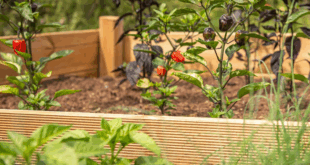When all the facts are considered, the Winter period is possibly the most important season for laying the seeds of success for next year’s thriving crops. Therefore, take a look and find out how to prepare your vegetable garden for winter.
4 Tips on How to Prepare Your Vegetable Garden for Winter
#1: Do the Veggie & Herb Cleanup
For all those wondering how to prepare your vegetable garden for winter and where to start, there is nothing better than a garden cleanup. Just like when you move into a new home, you’ll always change your sheets before going to bed, right?
Therefore, start by removing all the dead plants, and then, pull out all the plant stakes and temporary trellis. You can put the plants in the compost, but considering that low temperatures won’t destroy the organisms of pests and diseases in time, it is much better option to destroy the plants or throw them in the commercial waste bin instead.
#2: Test the Soil
If it seems that this season your vegetable garden didn’t thrive as you expected, the problem may not be in you, but in the soil itself. Namely, for the most successful season ever, you need quality and rich soil, and this is impossible to determine without testing. Please, don’t immediately imagine money flying out of your pocket, the tests are very simple to perform and don’t have to be expensive. Some of the test kits cost only a few pounds.
Take a look at this article to learn what features the best soil for your vegetable garden should have. To be honest, it is much more important to sort things out before planting in order to have a good harvest in return.
#3: Replenish Mulch
It’s no secret that mulching has many benefits, from providing nutrients for sandy soil to improving the soil’s ability to retain water. It is just as important in cold winter as it is in hot summer days.
However, it is important to emphasise that adding mulch to the surface of the soil helps in temperature regulation, can serve as a buffer against hard frosts, and, in addition, can greatly prolong your crop.
#4: Repair, Clean & Sharpen Tools
You don’t have to be an experienced gardener to know how important quality and clean tools are. Be sure to rejuvenate your tools’ lifespan by repairing them if something is broken and oiling them. Wash them regularly to remove dirt and debris, and sand away any rust with sandpaper or a wire brush.
Wrapping Up
Do you know what’s best of all? No matter what part of the world you live in, follow these four steps to help you prepare for the next gardening season. Finally, don’t forget to take a deep breath and enjoy the beauty that surrounds you. It could soon be covered by a thick layer of snow and ice until it melts in the spring.
Author’s Bio
Tony Manhart is the founder and editor in chief at Garden Song. Tony’s enthusiasm and rich experience in all things related to growing plants have led him to share his knowledge with gardening aficionados all over the world. When he is not working around his garden, Tony spends his time writing tips and tricks on various subjects related to plant cultivation and soil maintenance.
 Gardeners Club The Gardeners Club is a free to join online club for everyone with an interest in gardening and gardens.
Gardeners Club The Gardeners Club is a free to join online club for everyone with an interest in gardening and gardens.






